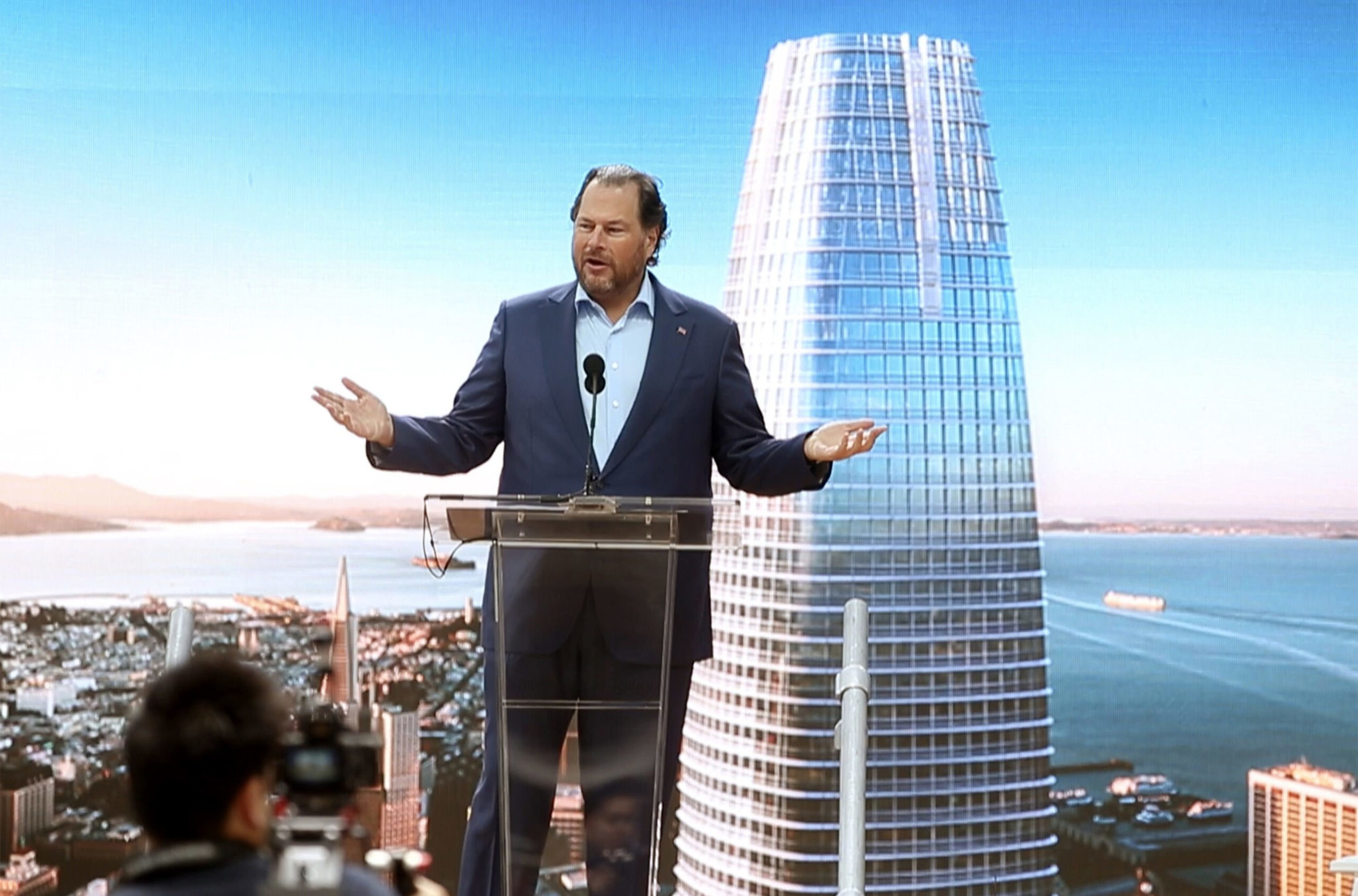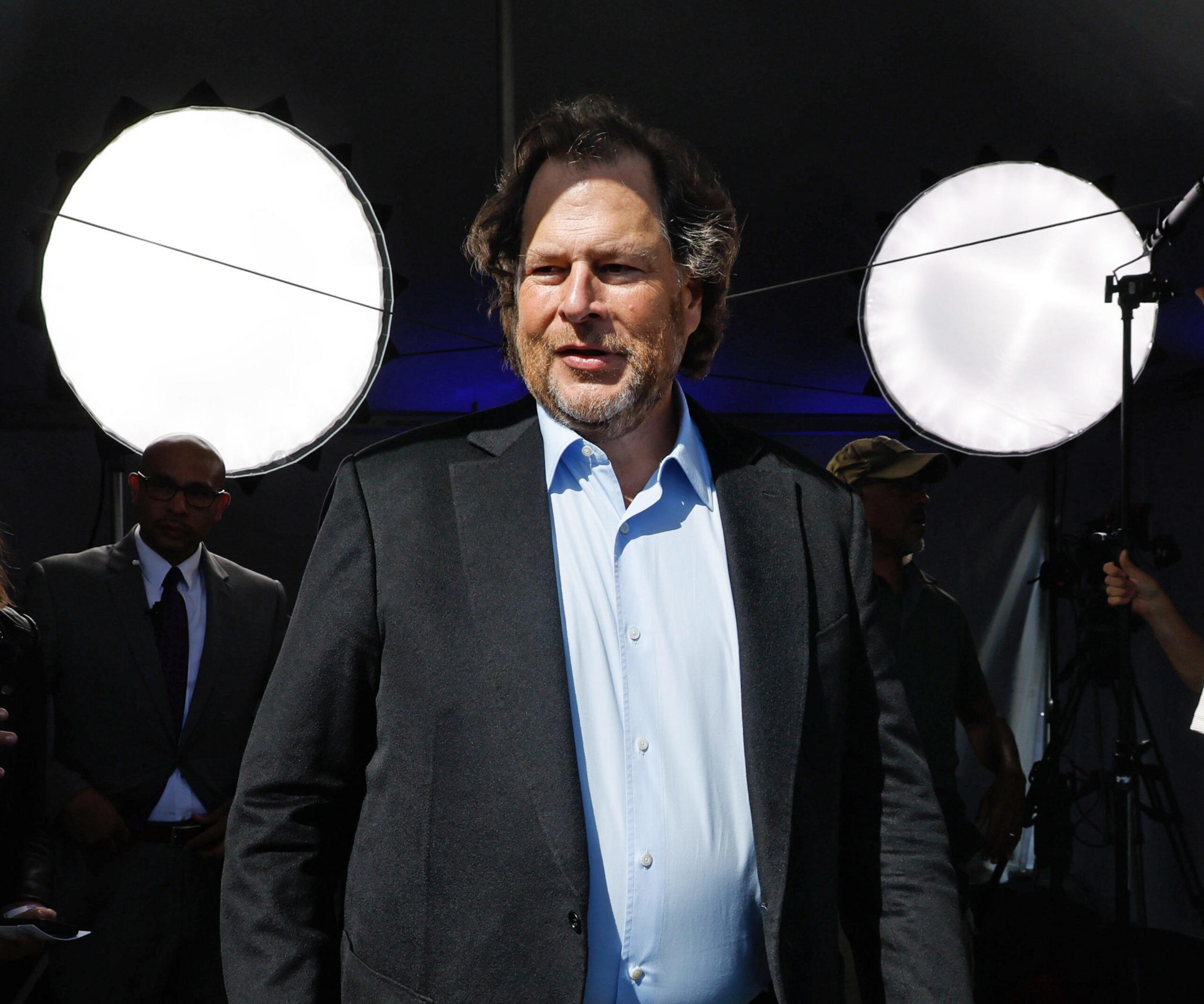Tech journalist Kara Swisher relishes her reputation as the grill master of the tech industry, noted for her ability to get leading CEOs to sit down in the hot seat and answer difficult questions.
At the Upfront Summit on March 2, she tangled with Salesforce CEO Marc Benioff on the company’s recent layoffs, its San Francisco tower and his relationship with Elon Musk.
The interview was published Tuesday as part of Swisher’s podcast (opens in new tab)—and Benioff had a lot to say about a recent round of layoffs, remote work, Elon Musk and Salesforce’s love-it-or-hate-it Downtown tower.
On Salesforce’s Layoffs
Benioff said that 2021 “was the best year tech ever had.” Then came the market correction kicked off by federal rate hikes and inflation.
Salesforce, which hired some 30,000 employees from the start of 2020 through the end of 2022, announced earlier this year that it would lay off around 10% of its workforce, or roughly 8,000 employees.
Swisher said within Salesforce’s “Ohana”—a Hawaiian term for family—the feeling has been closer to the Soprano family recently and asked if more layoffs were on the way.
Benioff argued that “as the company matures and grows, you have to constantly reshape it.” He deflected by pointing out that Microsoft announced layoffs the same night “they had Sting at a party in Davos.”
“I could just have not said anything. That’s much easier. But I don’t think that that’s the right thing to do. The right thing to do is to actually take the bullets,” Benioff said.
He said he expects long-term restructuring to integrate the company’s string of acquisitions, a buying spree likely to be on pause for the foreseeable future. “I think that we have enough right now,” Benioff said.
As for the growing number of activist investors lining up to challenge the company’s strategy and push for more cost reductions? Benioff joked he needed software to keep track of them all, but said he’s made an effort to get to know them and their priorities.
“So while some of them add a lot of value, some of them don’t. Some of them have great ideas. Some of them don’t,” Benioff said.
On Wokeness
Swisher pointed out that one of Salesforce’s activist investors is Strive Asset Management, a hedge fund co-founded by Vivek Ramaswamy, a Republican candidate for president and a crusader against “wokeness.” She asked how the pressure will impact Benioff’s own political positions.
Calling it “political shenanigans,” Benioff said that politicians around the world like to use Salesforce and other large software firms as a foil. He said what’s worse is when they try to discriminate against Salesforce employees.
He said his decision to tweet that he was going to “de-invest” from Indiana after then-Gov. Mike Pence signed an anti-LGBTQ law was the result of a few glasses of wine. But he realized he was committed when he saw his message on CNN the next morning.
He said Pence later called him, and they negotiated a compromise after more and more business leaders came out in support.
“I don’t feel like I am a woke CEO,” Benioff said. “In my heart, all I want to know is that my employees—whoever they are, whatever their sexual orientation is, their race, their gender, their religion—that they know we want them to have a great work experience and we’ll have their back.”
On Remote Work and Salesforce Tower
Benioff, who faced pushback from fellow CEOs after saying full-time office work was over, said the “post-pandemic reality” has become much clearer.
“When we look at business today, for our new employees who are coming in, we know empirically that they do better if they’re in the office, meeting people, being onboarded, being trained,” Benioff said. “If they are at home and not going through that process, we don’t think they’re as successful.”

Swisher asked the pertinent question for anyone tracking the fortunes of Downtown: Are you bringing back people to your “big-ass, giant-ass, idiotic” building in San Francisco? She called Salesforce Tower a “penis” that “ruined my view.”
In a roundabout answer, Benioff said that he sees two categories of employees. Fully remote workers whose numbers are “going to increase dramatically” and those who are returning to the office, which differs based on job function.
Engineering workers, Benioff said, only come in 10 days a quarter, whereas non-remote general and administrative employees are expected to come in on Tuesdays, Wednesdays and Thursdays. For sales and marketing, they are “more of a four-day-a-week executive,” he said.
“I don’t want to force anybody,” Benioff said. “You’re going to be in a bad situation with attrition. And we don’t want to lose our stars. So we don’t want mandates. We want reasons. We want to show them, ‘Here are the five reasons why we think you should be back in the office.’”
He said that he thinks bringing people to the tower is important for employees in building a culture. He apologized, albeit facetiously, for Salesforce Tower’s conspicuous impact on the city skyline.
“I ask the whole world to forgive me, and I will forgive the world,” he said.
On Elon Musk and Twitter
Swisher and Benioff also tangled over Elon Musk, particularly over the Salesforce CEO’s praise of Musk after he tweeted out a misleading statement in the wake of the attack on Paul Pelosi.
“How do you separate the visionary part from what’s happening, which is clearly problematic?” Swisher asked. She referenced a recent interview where Benioff said “Every CEO in Silicon Valley has looked at what Elon Musk has done and asked themselves: Do they need to unleash their own Elon within?”
Benioff responded with a list of Musk’s technological innovations at SpaceX, Tesla and Neuralink.
“I certainly think that the way I would handle certain things might have been different and have been. At the same time, I have a lot of respect for some of his ability to execute and innovate. So I think you have to look at that—there are two sides of the coin,” Benioff said.
Musk’s most recent project is also a point of fascination for Benioff, who said he regrets not buying Twitter back when he had the chance. He called Twitter “one of the great companies, brands, platforms.”
